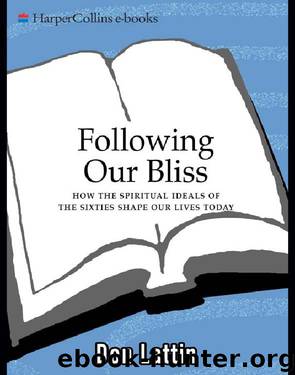Following Our Bliss by Don Lattin

Author:Don Lattin [Don Lattin]
Language: eng
Format: epub
ISBN: 9780061743733
Publisher: HarperCollins
Published: 2007-02-27T16:00:00+00:00
Back from Europe and his sexual awakening, Father McNeill turned his attention to the Bible. Even in the Catholic church, McNeill knew scripture was the first step toward changing hearts and minds. On first reading, scripture seems clear about the immorality of homosexuality. But McNeill and a new wave of Bible scholars argue that scripture is not so clear, not so simple.
John Boswell, a professor of history at Yale University, has done exhaustive research on early Christian attitudes toward homosexuality. Pointing to a long history of mistranslation and misleading interpretations of biblical writings, Boswell concludes that the New Testament takes no clear position on homosexuality. “To suggest that Paul’s references to excesses of sexual indulgence involving homosexual behavior are indicative of a general position in opposition to same-sex eroticism is as unfounded as arguing that his condemnations of drunkenness implies opposition to the drinking of wine.”9
Scholars like Boswell and McNeill argue that the same-sex references in the story of Sodom, the Holiness Code of Leviticus, and the letters of Paul do not refer to loving, faithful homosexual relationships, which were open and celebrated in Greek and Roman culture. They were talking about rape of enemy soldiers and the worship of idols. More study and careful translation shows that these references were to temple prostitution and lack of hospitality, not homosexuality as we know it today. Old Testament prophets were more concerned with the fruits of procreation than the sins of oral copulation. “There was a close link to procreation because of the Jewish covenant to go forth and multiply—that from among you will come a savior,” McNeill said. “For Christians, the savior had come, so there was no need, spiritually, to procreate to fulfill God’s will. That opened up the possibility of other lifestyles, and the church introduced the celibate, monastic lifestyle.”
Christian attacks on homosexuality are explained only partly by the later church’s fear and denial of the body and its elevation of the spirit. Boswell points out that the Jesus portrayed in the Gospel stories repeatedly condemns greed and hypocrisy, yet no Christian state has gone out of its way to imprison hypocrites or burn the greedy at the stake. “Obviously,” he writes, “some factors beyond biblical precedent were at work in late medieval states, which licensed prostitutes but burned gay people.”10
If the Bible is not the real source of Christianity’s long-standing condemnation of homosexuality, then what is? Certainly not ancient Rome, where the government taxed homosexual prostitution and even gave young male prostitutes their own holiday. “Roman society almost unanimously assumed that adult males would be capable of, if not interested in, sexual relations with both sexes,” Boswell writes. “It is extremely difficult to convey to modern audiences the absolute indifference of most Latin authors to the question of gender.”11
Boswell’s research into the roots of gay intolerance begins with early Christian efforts to reconcile Greek philosophy, the Jewish faith, and the teachings of the apostle Paul. It starts with Clement of Alexandria (c.150–c.215), a Greek theologian who asserted that “to have sex for any purpose other than to produce children is to violate nature.
Download
This site does not store any files on its server. We only index and link to content provided by other sites. Please contact the content providers to delete copyright contents if any and email us, we'll remove relevant links or contents immediately.
The Lost Art of Listening by Michael P. Nichols(7475)
Why I Am Not A Calvinist by Dr. Peter S. Ruckman(4133)
The Rosicrucians by Christopher McIntosh(3501)
Wicca: a guide for the solitary practitioner by Scott Cunningham(3156)
Signature in the Cell: DNA and the Evidence for Intelligent Design by Stephen C. Meyer(3114)
Real Sex by Lauren F. Winner(3000)
The Holy Spirit by Billy Graham(2931)
To Light a Sacred Flame by Silver RavenWolf(2800)
The End of Faith by Sam Harris(2722)
The Gnostic Gospels by Pagels Elaine(2515)
Waking Up by Sam Harris(2441)
Nine Parts of Desire by Geraldine Brooks(2354)
Jesus by Paul Johnson(2347)
Devil, The by Almond Philip C(2318)
The God delusion by Richard Dawkins(2292)
Heavens on Earth by Michael Shermer(2266)
Kundalini by Gopi Krishna(2165)
Chosen by God by R. C. Sproul(2148)
The Nature of Consciousness by Rupert Spira(2082)
